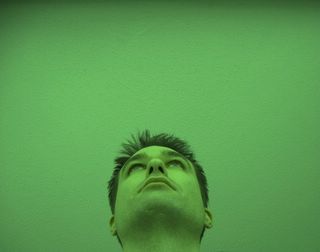I gave blood last week. Things didn’t go as smoothly as usual. As I filled out the questions on a clipboard like “Were you in Botswana any time between 1977 and 1986?” a woman lay on a cot beside me with a dampened napkin on her forehead. She must have fainted just before I got there. She laughed embarrassedly as all people do after they faint. Why? It’s not like their fly was open, but it must be a sign of weakness to faint when giving blood, and a sign of strength to see how quickly you can fill up the pint bag, then leap off the cot and head to your next meeting sporting your chartreuse arm band like a medal of honor.
Then I had to go behind a curtain with an interviewer and answer those embarrassing questions like “Have you ever paid to have sex, or had sex with someone who has been paid to have sex.” I don’t get into the debate with him on whether buying your date dinner at a trendy restaurant with tiny portions constitutes “paying for sex”, so I just say “no”. He asks if I’m on any medications. I should carry a laminated card of all my meds. I am held together by a complex cocktail of pharmaceuticals; at any given time I am likely under the influence of no fewer than four medications. Pfizer invites me to their Christmas party each year. Then he asks me to spell them, and what they are each for. Isn’t he the one in the white coat? I don’t remember half the time. Pill #1 is to offset the side effects of pill #2, and pill #3 is so that I can cope with the emotional trauma of what he is about to do to my little finger.
That’s right, what I fear most when giving blood is not the needle in the arm, but the pinprick on my finger for the blood test. He asks if there is a particular finger I’d like to sacrifice, which always reminds me of Sophie’s Choice. This little piggy suddenly is the focus of every nerve ending in my entire body. The spring loaded needle shoots into me, and there’s a split second of excruciating pain. Hallelulha, that’s over, but then the guy starts squeezing the finger like he’s milking a cow, and he starts jabbing the open wound with that tiny little plastic straw. This has got to be against the Geneva conventions.
I am escorted to a cot and handed over to a bloodletter. He’s a trainee. A woman with the air of authority watches from a chair ten feet away, offering up little hints as to what he is doing wrong. He has trouble finding a vein. Ex-girlfriends doubt I even have any, but with enough slapping around and squeezing and rubbing, they find what they’re looking for. The bloodletters, not the ex-girlfriends. They discuss which vein should be used and the angle at which the needle should go in. At the last moment the observer decides to get a second opinion. Another lady comes over and says, “Oh no, you don’t want to go in there because that’s a valve. Feel that? It would have been quite painful.”
They decide on a vein, and I feel the needle go in. I can tell something is wrong because they don’t say or do anything, until I feel a second stabbing sensation. “Your veins are running away,” she says. They get it after the third try, and the trainee attaches the tube and the bag, all of which I know is going on only out of my periphery. I make a point of never looking at the tube, the bag, the needle, any of it. I look off to the walls, or the people moving about, or listen in on the banter between the different volunteers.
He praises the rate at which I fill the bag, as though I had something to do with it, and before long I’m done. As he fills out paperwork he sets the bag on my outstretched legs. The blood is still warm. My eyes are glued to the wall, and I manage not to faint.
The next day, I see three puncture wounds in the crook of my elbow like I have been bitten by a three-fanged snake. Over the next few days the bruise spreads to the size of a baseball and changes from blue, to purple, to yellow.
Sunday, September 17, 2006
Subscribe to:
Post Comments (Atom)

No comments:
Post a Comment